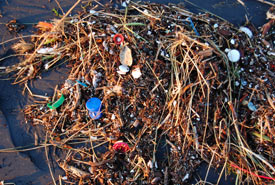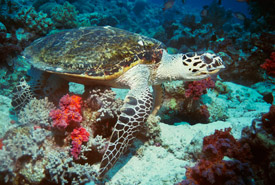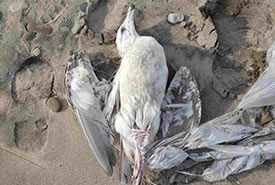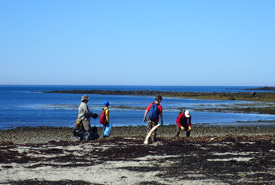How plastic waste threatens marine organisms

Plastic waste is often seen washed up on shorelines (Photo by Kevin Krejc/Wikimedia Commons)
Ocean plastic pollution has grabbed worldwide attention in quite a short period of time. This is because the impact of plastic waste on marine plants and animals is tremendous. Plastic garbage patches the size of small countries floating on the surface of the ocean, and images of marine organisms entangled and suffering due to plastic debris, have led to major mobilizations across the world to keep plastic waste out of the oceans.
With “Beat Plastic Pollution” the theme of UN World Environment Day this year, let’s take a look at the different ways in which plastic waste is a threat to marine organisms:
- Every year, fishes and other types of marine creatures consume several tons of plastic waste. This causes severe digestive problems, which mostly go untreated. Besides causing injury, plastic can also be passed down the food chain on to bigger fishes and mammals.
- Plastic garbage also leads to the invasion of non-indigenous species and organisms in marine colonies, which ride on large rafts of plastic across oceans. This poses a threat to the functioning of marine ecosystems.
-
Sea turtles are among the most common victims of plastic debris. They tend to mistake plastic garbage for food and consume it. This leads to blockages in their gut, ulceration and eventually death. Stray plastic nets used for fishing, along with plastic crates, also pose a threat to the lives of sea turtles, as they can get tangled in them and drown.

Loggerhead sea turtle (Photo by Anonymous/Public Domain)
- The population of stellar sea lions is also impacted by plastic waste debris in oceans. Fishing nets, lines and lures, plastic bags or plastic packing bands can become so entangled around these marine animals that they can result in severe infection and even death.
- Whales also often mistake plastic debris for a potential food source. Necropsies performed on whales found stranded and dead on the beach have shown an increase in the amount of plastic debris found in their bodies. The plastic waste often punctures and tears their stomach lining, which leads to starvation and eventually death. As reported by the Marine Pollution Bulletin, the rate of cetaceans ingesting plastic waste is as high as 31 per cent, and 22 per cent of them faced an increased risk of dying.
-
The lives of sea birds are also threatened by the plastic waste in oceans. Sea birds can mistake the smell and colour of plastic floating in the oceans and washed up on beaches for food. They can also get caught in the debris and die due to suffocation. By 2050, virtually every sea bird species on the planet will be eating plastic.

Gull with balloon ribbon wrapped around its feet (Photo by Jason Read)

Shoreline cleanup on Brier Island, NS (Photo by NCC)
You can do your part by collaborating with members of your community. Organize or participate in cleanup events in your area and on beaches. Even small actions such as cleaning streets, parking lots, footpaths and storm drains can help keep plastic waste from polluting our waterways and oceans.
You can learn more about environment-saving techniques by visiting my blog on the Compactor Management Company website.


